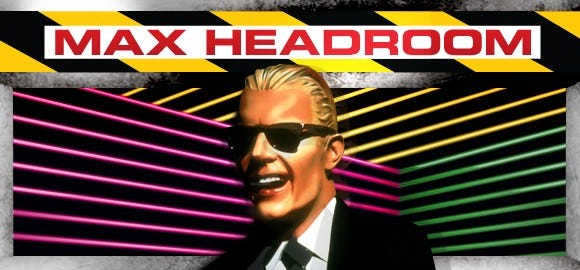Max Headroom Episode 1: Blipverts
TV is everywhere and networks vie for ratings and advertising -- but a new ad model has lethal side effects.
In the coming months I will be reposting content from my former author website on my Substack. I do plan to have new, original content as well, depending on my schedule.
Last week, I wrote about the short-lived 1980s series Max Headroom. This week, I'm sharing my review of the first episode, along with new thoughts about the episode and how the themes relate to society today.
Episode name: Blipverts
Premise: Edison Carter, star reporter for Network 23, discovers a recent death is linked to Blipverts, the new advertising technique his own network is utilizing.
Theme explored: The episode revolves around advertising and its influence on decisions made by media conglomerates, along with asking the question about what happens when a journalist's pursuit of a story comes into conflict with the very corporation the journalist works for.
Blipverts are advertisements designed to compress multiple three-second advertisements into a 30-second span each time, resulting in viewers finding it harder to change the channel. The technology is favored by Network 23's top advertising client, the Zig Zag Corporation, who is unwilling to drop Blipverts even after the revelation that a TV viewer died after watching them.
Max Headroom quotes:
"Network 23: The network where two's company and three's an audience."
"The executive board? You mean, you're the people who execute audiences?"
"Tune into Network 23, the network that's a real mind blower -- love those Blipverts!"
"I know you're looking at me and thinking to yourself, 'Why, he could be a star.' Well, let me just suggest humbly that -- you're right, I could!"
"How can you tell when our network president is lying? His lips move."
Personal observations: The first episode of Max Headroom explores themes that are still relevant in today's world, particularly with the huge influence that mass media has over today's society. Corporations want to get the word out about their products and are willing to explore any means to advertise and some will raise questions about ethics. Blipverts takes that issue to its ultimate extreme, in which a method of advertising proves lethal.
The episode does a good job establishing Edison Carter as a person who deeply believes in journalism as getting to the truth and keeping viewers informed, but he seeks to maintain a level of professionalism at all times, even when he engages in covert methods to get to the truth. His computerized alter ego, Max Headroom, takes a different approach -- he is more interested in getting himself over with audiences, but there is a lot of truth to what he has to say. Both generate material that keeps audiences interested, even as the executive board struggles with the idea that they are risking the bottom line by letting both personalities reveal the truth in their own ways.
The episode establishes the relationship between Theora, the camera controller who works alongside Carter, in getting through Carter's rough exterior and showing that he can trust her. It also sets the table for future storylines, such as Ben -- the one member of the executive board who sets limits as to how far he'll go to ensure the bottom line -- and Grossberg -- the Network 23 chairman who is more concerned with the bottom line than anything else -- and how they will each impact future decisins, and how Bryce, the technical genius who creates Blipverts, Max Headroom and other technological advances, becomes something of a wild card.
This was a good episode that can stand on its own while still allowing for future storylines to unfold.
Additional thoughts several years later: Some might say that we have a modern-day Blipverts, even if it doesn't compress multiple advertisements into a 30-second span. For example, what do some have to say about TikTok and what it does to a person's brain?
And while we have yet to see evidence that a person died simply by using TikTok, there is evidence that the app, along with other social media apps, has an impact on a person's mental health.
Also, in the dystopian world of the Max Headroom TV series, televisions are almost everywhere -- even those who live in the poorest neighborhoods gather around a TV all the time. You can make a direct comparison to today's society, in which you replace the TV with the smartphone, on which you might consume mass media all day long.


